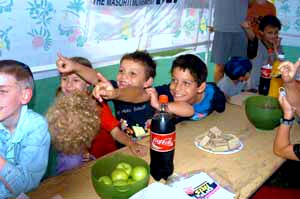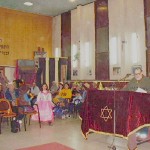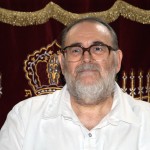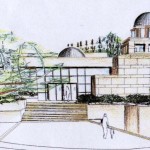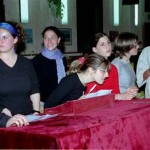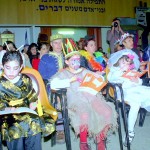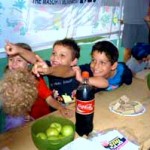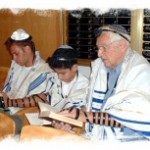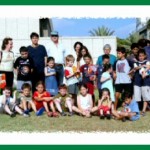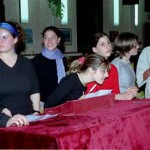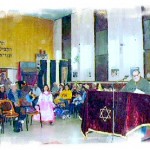| Rabbi Simchah Roth President, Jack Ziv-El Bet ha-Ezra, Ben-Gurion 7 46100 Herzliya ISRAEL Phone: 011-972-9-958-3161 E-mail: jzivel@netvision.net.il http://www.torat-hayyim.org.il |
 |
About
Torat Hayim Congregation was founded in 1978, just in time for the High Holidays of that year. The founding members were mainly from English-speaking countries, but since then many inhabitants of Herzliya have joined the congregation who are not of ‘anglo-saxon’ origin. We now have members who are purely Hebrew-speaking; we have members whose mother-tongue is French, or Spanish, or Hungarian, or Persian, or Arabic, or Romanian, or German – and so forth.
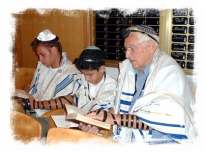 The language that is used in all our common activities is Hebrew. In the synagogue notices are given in Hebrew, and the rabbi always addresses us in Hebrew, and, of course, all the prayers are in Hebrew. (For our services we use the prayer-book of the Masorti Movement, Va’ani Tefillati, which was edited by our own rabbi.) But we always show a warm welcome to our guests in their own language, and they will almost always find people at the services who speak their language.
The language that is used in all our common activities is Hebrew. In the synagogue notices are given in Hebrew, and the rabbi always addresses us in Hebrew, and, of course, all the prayers are in Hebrew. (For our services we use the prayer-book of the Masorti Movement, Va’ani Tefillati, which was edited by our own rabbi.) But we always show a warm welcome to our guests in their own language, and they will almost always find people at the services who speak their language.
The activities and infrastructure of our congregation are funded by the dues paid by the members and by donations received from well-wishers. Since we receive no governmental support at all the strings of our communal purse are always strained. Of recent years we have been blessed with a modest annual subvention from the local authority: the incumbent mayor and council have been most friendly and helpful towards us, which is certainly a novel and pleasing experience for us. Our congregation is a legally constituted independent non-profit organization which is also an affiliate member of the Masorti Movement in Israel, from which we also receive some very welcome financial support.
We believe that each person is entitled to his own belief-system. Nevertheless, we have also emblazoned on our standard, as it were, “Torah and commandments – doing it our way”. A large proportion of our members have adopted the secular way of life, so we certainly understand the hesitancy of the secular person towards religious ritual. We respect the secular person as such and strive to create an easy atmosphere with ‘ways of pleasantness’.
Over the past decade or so our congregation has taken several steps in the direction of egalitarianism. Sometimes these steps have been painful and some members have felt uncomfortable about them, but they have all now been successfully integrated into the life and custom of our congregation. It would be fair to say that today our synagogue is fully egalitarian – at least in principle. (That means that there are still some areas where we refrain from giving full egalitarianism regular practical expression so that all who worship with us will feel comfortable.)
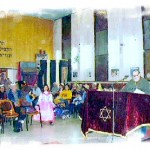 In our synagogue we have mixed seating. Both men and women regularly take part in the Torah reading, not only as honorees receiving an aliyyah to the Torah, but also as Torah readers. All honors that the congregation can bestow – both organizational and liturgical – are open to both men and women alike.
In our synagogue we have mixed seating. Both men and women regularly take part in the Torah reading, not only as honorees receiving an aliyyah to the Torah, but also as Torah readers. All honors that the congregation can bestow – both organizational and liturgical – are open to both men and women alike.
Our Torah reading is according to the annual system, which is almost universal in the State of Israel. The task of reading the Torah is shared between our rabbi and various volunteers from the congregation. Even more members of the congregation share the task of reading the haftarah. Many of our members also serve as leaders of the prayers, which are under the general aegis of our rabbi.
Our services are conducted in an atmosphere of easy decorum and they are accompanied by a lot of communal singing. We are a community, not just individuals who have gathered together by chance for worship, as is the case in most Israeli synagogues. We try to emphasize inclusivity for our children and our youth.
The social aspect of our congregation is very important to us, and we are a very close-knit congregation. Almost every Shabbat and festival we have a communal kiddush after the service to which all are invited and this precious time also serves a social function which is very dear to us. This kiddush is almost always prepared by one of the families in our congregation who invite all the other worshipers to join them.
Activities and News
- Bar and Bat Mitzvahs
The celebration for boys and girls is identical in our synagogue. The only difference is that Bat Mitzvah celebrations usually take place when a girl reaches her 12th birthday, while Bar Mitzvah celebrations are held when a boy reaches his 13th birthday.
- Youth Activities
On an average we have a special Youth Shabbat once a month. Children, ages ranging between 4 and 14, have their own special activities. After the Torah Reading they join the main service for a quiz on the week’s Parashah in which lots of Smiley stickers are distributed which are later redeemed for small prizes. It is a most heart-warming sight to see these youngster sitting on the carpet in front of the ark answering the quiz questions – usually posed by Dr Aryeh Friedler.
Another very successful venture of the Youth Commitee was an excursion to Bet ha-Tefutzot in Tel-Aviv during the summer of 2003. Here our youngsters had an opportunity to learn about Jewish life in the diaspora in ages past – and they thoroughly enjoyed themselves. Please click here to browse through some mementos of that visit.
The yearly round of festivals also plays a very important part in our youth activities. Before the festival of Sukkot, for example, our youngsters get together to prepare decorations for the communal Sukkah, and during ?ol ha-Mo’ed they have an Ushpizin afternoon at which many of our youngsters host their friends and neighbours as guests in our Sukkah. A very good and joyous time is had by all – as befitting the joyous festival of Sukkot.

